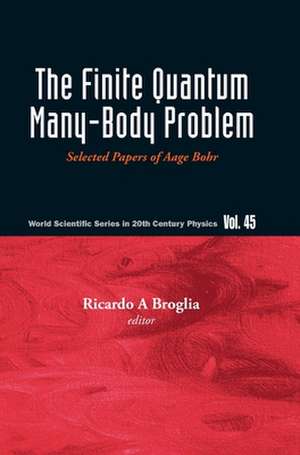FINITE QUANTUM MANY-BODY PROBLEM, THE: World Scientific Series In 20th Century Physics
Autor Ricardo A Broglien Limba Engleză Hardback – 19 aug 2019
The selected papers of Aage Bohr published in the present volume provide a clear account of Aage Bohr's ideas concerning the finite quantal many-body system. These ideas changed the nuclear paradigm and connected the field of nuclear physics with that of quantum condensed matter physics as well as with Quantum Electrodynamics (QED). It has also inspired a whole generation of theorists and experimentalists, helping to create the "Copenhagen School of Nuclear Physics" which turned the Niels Bohr Institute into the Mecca for research in this subject during the 1960s and 1970s. The legacy of Aage Bohr's scientific achievements and that of the school he founded are felt to this day in connection with the cutting-edge research carried out at the forefront of nuclear structure and nuclear reaction studies.
Remembering the words of the sage that "We are dwarfs mounted on the shoulders of giants, so that we can see more and further than they", the present volume is an attempt at seeking illumination from Aage Bohr, through the reading of his masterfully written papers, and by reflecting over commonly experienced events. Furthermore, it may help practitioners acquire an overall view of the basis of modern theory of nuclear structure.
Preț: 522.62 lei
Preț vechi: 614.84 lei
-15% Nou
Puncte Express: 784
Preț estimativ în valută:
100.00€ • 108.97$ • 84.27£
100.00€ • 108.97$ • 84.27£
Carte tipărită la comandă
Livrare economică 23 aprilie-07 mai
Preluare comenzi: 021 569.72.76
Specificații
ISBN-13: 9789811208133
ISBN-10: 9811208131
Pagini: 236
Dimensiuni: 175 x 250 x 17 mm
Greutate: 0.59 kg
Editura: World Scientific
Seria World Scientific Series In 20th Century Physics
ISBN-10: 9811208131
Pagini: 236
Dimensiuni: 175 x 250 x 17 mm
Greutate: 0.59 kg
Editura: World Scientific
Seria World Scientific Series In 20th Century Physics
Descriere
Aage Bohr (19222009) was the central artificer of the unification of the independent (shell)- and of the collective (liquid drop)-models of the atomic nucleus. This unification constitutes the basis of what can be called the second discovery of the atomic nucleus, for which Aage Bohr and his close collaborator Ben Mottelson co-shared the 1975 Nobe


